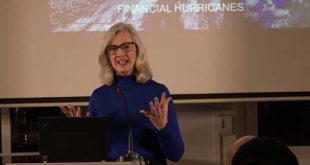A version of this post appeared on Pieria in December 2013. In my post “The desert of plenty”, I described a world in which goods and services are so cheap to produce that less and less capital is required for investment , and so easy to produce that less and less labour is required to produce them. Prices therefore go into freefall and there is a glut of both capital and labour. This is deflation. There are two kinds of deflation. There is the “bad” kind, where asset prices go...
Read More »The desert of plenty
This post first appeared on Pieria in November 2013. Throughout history, humans have dreamed of plenty. They have longed for there to be abundant supplies not only of essentials, but of luxuries. The promise made to the Israelites wandering in the desert was that they would eventually come to a land “flowing with milk and honey”. And the vision of the New Jerusalem in Revelation is of riches beyond imagination. Recent forecasts of forthcoming abundance, too, have focused on...
Read More »Keynes and the death of capitalism
In a recent article for the New Statesman, the economics commentator Grace Blakeley makes an extraordinary claim. Writing about the origins of the IMF, she says: Seventy-five years have passed since these international financial institutions were created in Bretton Woods, New Hampshire, in 1944. Back then, delegates sought to tame the power of international finance, the growth of which helped to cause the 1929 Wall Street Crash and the ensuing Great Depression. JM Keynes – who led the...
Read More »Weird Is Normal
This post was originally published on Pieria in December 2013. Since then, the idea that the long-term real equilibrium interest rate must be equal to or lower than the long-term sustainable growth rate has become much more mainstream. I am just amazed that anyone ever thought it could be otherwise. A long-term real interest rate persistently above the sustainable growth rate cannot possibly be an "equilibrium" rate. As I show in this piece, it can only be maintained through rising...
Read More »Why Central Bankers Don’t Understand Inflation
My debut post at CapX develops a theme I have written about many times. Central bankers are tasked with controlling inflation, but they don't understand it. For the last decade, central banks in developed countries have been pursuing policies designed to raise inflation. Quantitative easing, cheap funding for banks, tinkering with yield curves, low and negative interest rates – all aim to raise inflation to the ubiquitous 2% target. Understandably, central banks’ inflation forecasts...
Read More »Inflation Is Always And Everywhere A Political Phenomenon
We don't understand inflation. Those who lived through the high inflation of the 1970s are convinced that inflation is always and everywhere caused by wage-price spirals. Germans, economic Austrians and Bitcoiners are convinced that inflation is always and everywhere caused by central bank money printing. Small-state supporters are convinced that inflation is always and everywhere caused by profligate governments borrowing and spending excessively. Hard money enthusiasts are convinced that...
Read More »A Fine Example of Crypto Ignorance
The video blogger Crypto Eri (@sentosumosaba) thinks she has evidence that the American Bankers' Association (ABA) wants the Federal Reserve to adopt Ripple/XRP as its cross-border settlement system. She has found a letter from the ABA which makes three requests to facilitate faster interbank settlement:A liquidity management tool Interoperability Access for chartered financial institutions Hey hey everybody, this looks just like Ripple's bag, doesn't it? "You are going to see how...
Read More »Frances Coppola: Financial Hurricanes
It is widely believed that risky behaviour by banks caused the 2007-8 financial crisis. In fact it is avoiding risk, not taking it, that creates the financial storms that crash our economy. Frances Coppola depicts that not only the Great Financial Crisis itself, but also the Eurozone crisis, were financial storms caused by cross-border financial flows which were driven by the search for high yield at zero risk. She discussed the often ignored role of insurance in creating these storms....
Read More »Frances Coppola: Financial Hurricanes
It is widely believed that risky behaviour by banks caused the 2007-8 financial crisis. In fact it is avoiding risk, not taking it, that creates the financial storms that crash our economy. Frances Coppola depicts that not only the Great Financial Crisis itself, but also the Eurozone crisis, were financial storms caused by cross-border financial flows which were driven by the search for high yield at zero risk. She discussed the often ignored role of insurance in creating these storms....
Read More »A lack of compassion
It's Saturday afternoon, and I have just returned from singing Evensong at Rochester Cathedral. The first reading was the dreadful story of Laban's deceitful behaviour towards Jacob. Laban made Jacob work for seven years in return for a promise of his daughter Rachel's hand in marriage. But at the end of the seven years, Laban palmed Jacob off with his other daughter instead, then made him work for another seven years to claim the hand of the woman he loved. This story is horrible not just...
Read More » Francis Coppola
Francis Coppola










